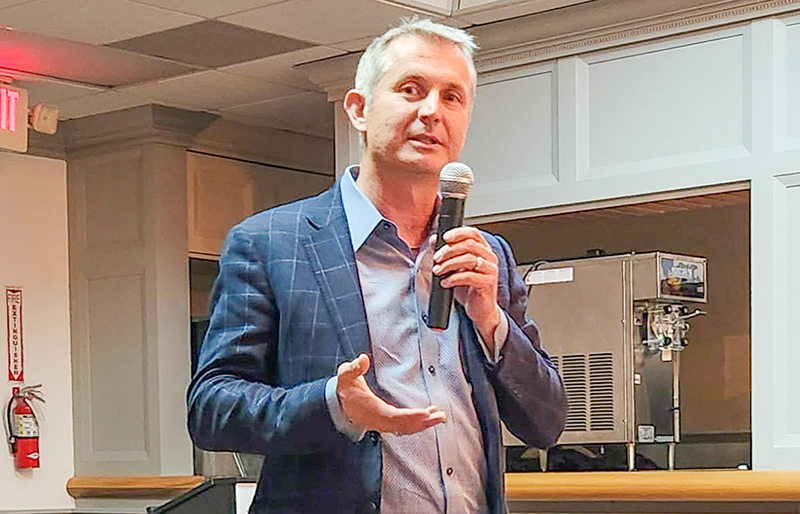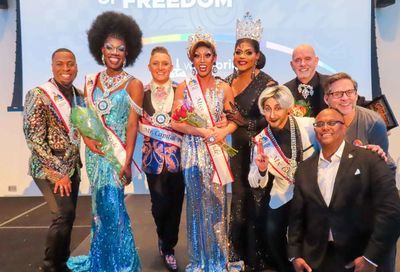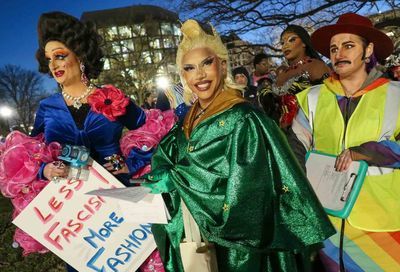Transgender Day Of Visibility: What You Need To Know
“Our lives are worthy and we should be celebrated,” says NCTE’s Olivia Hunt of Transgender Day of Visibility.

Ahead of the 2022 International Transgender Day of Visibility, Thursday, March 31, we spoke with Olivia Hunt of the National Center for Transgender Equality, a Washington, D.C.-based advocacy group.
Hunt, who joined the organization last April and became its policy director in February, helped to clarify, for those who may be unaware, what “TDOV” is, and what the LGBTQ community and its allies can do to celebrate the day and lift up the transgender community during these times of, as she calls it, “unprecedented attack.”
Excerpts from the interview, edited for clarity, follow.
METRO WEEKLY: What is Transgender Day of Visibility?
OLIVIA HUNT: Trans people’s lives are usually portrayed in a series of negatives. We focus on talking about discrimination. We focus on talking about the struggles of transition, the struggles of being seen in our lives for who we are.
Trans Day of Visibility is a day specifically to celebrate trans people’s lives and joys, not as struggles, but as triumphs as something to be happy about, to be proud of, to stand up and say that we are here, we are happy, we’re part of our community and our lives are important. That our lives are worthy and we should be celebrated.
MW: I’ll be honest, we’ve had a hard time finding physical events attached to it, especially locally.
HUNT: That’s something that’s changed over the years. Obviously, COVID — the fact that we are still, despite what some people think, living in the middle of a global respiratory pandemic means that we’re not seeing a lot of in-person gatherings, the way that we might in other situations.
But Trans Day of Visibility is different because it has historically been celebrated a lot on social media. It has been about being proud and visible and sharing our triumphs online, as a distinct difference from Trans Day of Remembrance, which has always been an event with solemn in-person gatherings and memorials for those that we’ve lost.
Trans Day of Visibility has been celebrated in the past with in-person events, parties, there have been some parades, but oftentimes it’s been a quieter and happier and more online-focused event, making the point that we are part of the communities that we’re in, sharing pictures, sharing our joy and our wins over the past year. It is, just by itself, a celebration of our existence.
MW: What are the best ways for people to participate online?
HUNT: On most internet spaces you’ll see something like #TransDayofVisibility or #TDOV trending. Sharing things to those tags can be vital. One thing that can be really helpful, especially for cisgender members of the community, is focusing on “signal boosting” and drawing awareness to trans people in their lives and in their communities, drawing attention to the successes of trans people without reservation or without pause.
MW: Over the past several years, legislative attacks have escalated against the transgender community. What do you think has caused it?
HUNT: As much as I’d love to focus on the positive aspects of things, it’s undeniable that the trans community is under unprecedented attack. Since January 1, [2022,] we’ve been tracking a total of 196 active bad bills across the country. And that’s in 38 different states.
Why is this happening? It’s happening because politicians have decided they found a new acceptable target. When they lost on being able to use anti-gay rhetoric, they found that people were more willing to listen to anti-trans rhetoric. You can see going back to 2016, when we first had HB 2 introduced in North Carolina — that was the first of the big bathroom bills that went through — [opponents] have been looking for a way to get an attack against trans people that will stick…and gets traction. And what they’ve settled on is attacks on children.
Really, all of these bills that have come out against trans people over the past year are about trying to claim that trans people don’t belong. Banning children from sports, banning children from participating in school activities, banning children from bathrooms, banning the existence of trans people from being discussed in the classroom.
Those are all ways of trying to teach the youngest and most vulnerable trans people that they don’t belong. It’s nothing short of bullying. It is adults picking a fight with children. Children who are in a vulnerable situation, children who are in no position to defend themselves, all for a little bit of political gain. All to try to move a needle by a couple of degrees, just to give a small political advantage. And that’s one of the most monstrous things that I can say I’ve seen in my 43 years on this earth. Adults coming after children, adults hurting children, just for their own advantage, on scale like this. It’s nauseating.
I think that Governor Cox in Utah had the most salient point on the subject when it came down to his statement of vetoing [his state’s] sports ban. He said that among the thousands of high school athletes who are participating in sports across Utah, there were four who were trans. And in no case had there been any meaningful complaint about those children participating.
These are laws that are being pushed through not to answer any problem, not to actually make anybody’s lives better anywhere in the country. It’s all being done because politicians are trying to score some political points after they lost on gay marriage.
MW: How do we halt the right-wing steamroller? There’s no easy answer, of course, but there must be a strategy.
HUNT: There is no one easy answer, but there are a lot of hard answers.
The first one is awareness and engagement. I talked about one of the things that allies can do during TDOV to promote trans people’s lives — share out stories of trans joy and trans victory and trans existence. It wasn’t really until Texas decided to start persecuting the families of trans children that we saw allies start to take notice on the national stage.
Being more active, being more aware and being more vocal, drawing attention to what’s being done, is crucial because one of the things that has driven a lot of this action over the past six years as these anti-trans bills have grown and grown is this belief lawmakers have that they can just get away with it because nobody cares. Showing them vocally that people do care is one of the most powerful things that we can do.
When you’re one percent of the population, it’s easy to feel isolated and alone. And getting a broad range of support, especially from folks who are cisgender and heterosexual, and not just having support coming from within the LGBTQ community broadly, is really vital to showing that our lives are important and our lives matter.
Beyond that, the next hard thing to do is to fight back against bad bills and bad policies when they get introduced in each state. Push people to participate in Lobby Days, to participate in phone banking, to get the word out and show politicians that their constituents are opposed to these actions.
Showing support for trans people is one thing, showing politicians that their actions are being opposed by their constituents is another — and is even more important. Most states have statewide equality organizations or trans rights organizations that have been active for years trying to fight these bad bills and promote good ones.
There’s also NCTE and other national organizations, which have action centers where you can sign up for alerts and information about how to get involved with phone banking, with letter-writing campaigns, or lobby days. Those can all be found if you go to NCTE’s website, transequality.org, and sign up at our action center.
Finally, state and national organizations like NCTE need funding. The people promoting anti-trans movements across the country are incredibly well-funded. Fighting them takes time, it takes energy, and it takes money.
If folks want to support this fight financially, that can be one of the most powerful tools that we have. And every one of those organizations — the national LGBTQ rights organizations like NCTE, as well as state organizations like Transgender Education Network of Texas or TransOhio — all have websites where they will let you know how to get them financial contributions to help their fight.
Having a tide of voices helps, but having that financial backing is important, too, because the folks who are trying to hurt us, the folks who are going after children, are not afraid to spend a lot of money to do so.
Transgender Day of Visibility is Thursday, March 31, 2022. For more information on the National Center for Transgender Equality and its programs, or to donate, visit www.transequality.org.
Support Metro Weekly’s Journalism
These are challenging times for news organizations. And yet it’s crucial we stay active and provide vital resources and information to both our local readers and the world. So won’t you please take a moment and consider supporting Metro Weekly with a membership? For as little as $5 a month, you can help ensure Metro Weekly magazine and MetroWeekly.com remain free, viable resources as we provide the best, most diverse, culturally-resonant LGBTQ coverage in both the D.C. region and around the world. Memberships come with exclusive perks and discounts, your own personal digital delivery of each week’s magazine (and an archive), access to our Member's Lounge when it launches this fall, and exclusive members-only items like Metro Weekly Membership Mugs and Tote Bags! Check out all our membership levels here and please join us today!
























You must be logged in to post a comment.